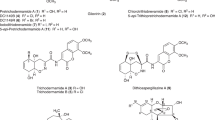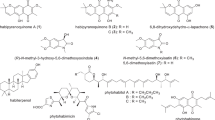Abstract
IN 1955 Wright et al.1 demonstrated that pimelic and azelaic acids stimulate the biosynthesis of biotin in Aspergillus niger. Since then, three groups2–4 of workers have established that pimelic acid is a precursor in the biosynthesis of biotin. It remained to be tested whether or not pimelic acid is a by-product of the microbial degradation of azelaic acid.
This is a preview of subscription content, access via your institution
Access options
Subscribe to this journal
Receive 51 print issues and online access
$199.00 per year
only $3.90 per issue
Buy this article
- Purchase on Springer Link
- Instant access to full article PDF
Prices may be subject to local taxes which are calculated during checkout
Similar content being viewed by others
References
Wright, L. D., Cresson, E. L., and Driscoll, C. A., Proc. Soc. Exp. Biol. and Med., N.Y., 89, 234 (1955).
Eisenberg, M. A., Biochem. Biophys. Res. Comm., 8, 437 (1962).
Elford, H. L., and Wright, L. D., Fed. Proc., 21, 467 (1962).
Lezius, A., Ringelmann, E., and Lynen, F., Biochem. Z., 336, 510 (1963).
Janota-Bassalik, L., and Wright, L. D., J. Gen. Microbiol. (in the press).
Author information
Authors and Affiliations
Rights and permissions
About this article
Cite this article
JANOTA-BASSALIK, L., WRIGHT, L. Pimelic Acid as a By-product of Azelaic Acid Degradation by Pseudomonas sp.. Nature 204, 501–502 (1964). https://doi.org/10.1038/204501a0
Issue Date:
DOI: https://doi.org/10.1038/204501a0
Comments
By submitting a comment you agree to abide by our Terms and Community Guidelines. If you find something abusive or that does not comply with our terms or guidelines please flag it as inappropriate.



